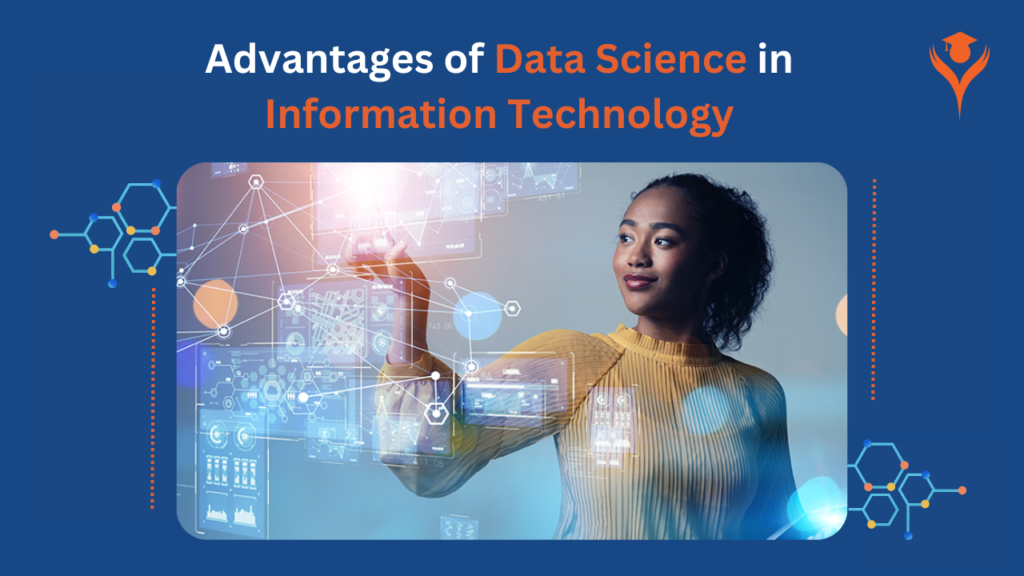Today’s era deals more with data and information. Effectively utilizing data is crucial for every company, organization, and startup, as it enables them to make informed decisions that drive their business forward. There is a science of data that speaks about how to analyze and interpret the data, which we call Data science. It produces and analyzes massive amounts of data, and it is the most debated topic in the field of Information Technology. The popularity of the utilization of data science has increased rapidly, and most industries totally rely on data to grow their businesses.
By utilizing modern tools and techniques, data science extracts meaningful information, uncovers unseen patterns, decodes complex information, and performs various other tasks when dealing with large volumes of data. Information technology employs these data to extract the maximum benefit for the company’s business. Now it’s the time to know about the advantages that Data Science provides to the Information Technology sector.

Improved decision-making:
Proper data analysis, including interpretation of raw data and consideration of all relevant information, is necessary for making any decision. Omitting any pertinent data can compromise the final decision. It has improved decision-making using the data-driven approach. You can raise a question: How does data science improve decision-making in information Technology?
Data science provides evidence-based insights allowing organizations to take decisions based on the received data rather than on assumptions. Leveraging vast amounts of data can provide a more precise depiction of the situation at hand. Data science identifies potential risks and helps organizations to mitigate those risks by taking clear-cut decisions. With the help of automating manual tasks, and provides more free time enabling the organization to make decisions very quickly.
Better customer understanding:
Data science helps in understanding customer behavior, feedback, and preferences by taking insights that are based on different parameters. Here are the methods that help IT organizations understand the customer effectively.
Customer data analysis: Through the use of this, businesses can better understand their customer’s habits and preferences by analyzing data like purchase records, demographic details, and reviews and comments.
Predictive Modeling: These techniques forecast future customer behavior based on historical data.
Customer segmentation: Based on the common characteristics of the customer, the organizations segment them into different groups based on common characteristics. This allows organizations to tailor their offering and market strategies to meet specific needs.
Improved Risk Management:
Risk Management is one of the areas where most companies provide more attention to stay out of any troubles caused due to data breaches or any other errors caused during the operation procedures. Data science helps in managing risks in several ways. Some of the techniques that most of the IT sectors use are listed.
Anomaly detection: Using anomaly detection methods, data scientists can spot suspicious trends that could foreshadow any potential risks.
Data Visualization: Data Visualization is used to present risk data that is easy to understand and interpret, which allows organizations to make informed decisions.
Predictive maintenance: This method is implemented when equipment is on the verge of failing. This technique is used to schedule, maintain, and avoid potential risks.
New product and service development:
Using the findings and suggestions gleaned from data analysis, data science can aid in the creation of innovative products and services. It can help you analyze markets, identify opportunities, and better serve your customers. Surveys, comments from customers, sales figures, and even social media posts can all be used to compile useful data. At every stage of the process, the outcomes can inform data-driven decisions regarding product design, marketing, and other areas. In the end, data science can help boost the chances of a hit with brand-new offerings.
Better understanding of operations:
Data science plays a critical role in improving operational efficiency by providing insights and recommendations based on data analysis. It helps organizations better understand their operations, identify areas for improvement, and make data-driven decisions.
One of the main ways data science helps organizations understand their operations better is by providing visibility into key performance metrics. For example, by analyzing sales data, organizations can identify trends and patterns, such as the best-selling products, the most profitable sales channels, and peak selling periods. They can be used to optimize inventory management, distribution strategies, and pricing.
Data science can also help organizations identify inefficiencies in their operations. By analyzing supply chain data, organizations can identify bottlenecks, delays, and other areas that slow down their operations.
Another way data science helps organizations understand their operations better is by providing insights into customer behavior and preferences. By analyzing customer data, organizations can identify trends in customer behavior, such as purchasing patterns, product preferences, and customer satisfaction. Data science uses this information to get data on product design, marketing strategies, and customer service processes.
By providing insights and recommendations based on data analysis, organizations can identify areas for improvement, make data-driven decisions, and identify new opportunities for growth and expansion.
Increased competitiveness:
The Rivalry between the companies in Information Technology is much higher. Every day new software or any other application emerges, which is creating more impact in the industry. Data science leverages the data to gain a competitive advantage.
Data science provides valuable insights to organizations in the way of customer behavior and preferences. Analyzing these customer data can gain a deeper understanding of customer needs, preferences, and pain points. After that can inform product design, marketing strategies, and customer service processes.
The application of data science in the business world can also improve security and reduce risk. Organizations can better prepare for security incidents and address vulnerabilities by analyzing security data. Using this data to implement security measures, enhance security processes, and decrease the probability of security breaches can enhance competitiveness by improving security and reducing risk.
In a Nutshell:
Data science has a profound impact on the information technology industry. It provides organizations with valuable insights into customer behavior and preferences. And enables operational optimization and efficiency, identifies new growth opportunities, and enhances security. These benefits allow organizations to make data-driven decisions, leverage data to gain competitive advantage, and stay ahead in the fast-paced evolving information technology. Data science has become an essential tool for organizations seeking to improve their operations, stay ahead of the competition, and drive growth in business organizations.






